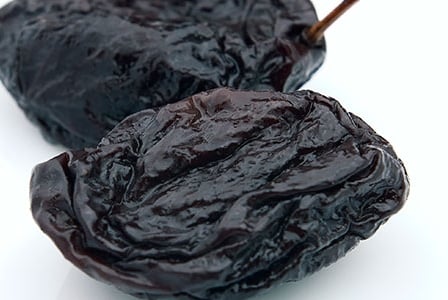
They fight disease, nourish our bodies and uplift our spirits. Superfoods contain a plethora of vitamins, minerals and antioxidants that work hard to keep us healthy by warding off all that ails.
While exotic foods such as acai berries, quinoa, chia seeds, edamame and turmeric often get the spotlight for their healing properties, some of the healthiest superfoods can be found stocked in our kitchen cupboards.
Rich in health-promoting nutrients and low in kilojoules and saturated fats, the following underappreciated everyday foods are the unsung heroes of the superfood world.
01
Prunes
An excellent source of dietary fibre, vitamin K and disease-fighting flavonoids, prunes may not be the prettiest fruit, but their nutritional profile is pretty impressive.
Best known for their laxative properties, emerging research suggests that, when consumed regularly, prunes may also be highly effective in preventing and treating osteoporosis. In one study, researchers from Florida State University found postmenopausal women who ate 10 to 12 prunes a day over the course of three months experienced a reversal in bone loss. Researchers believe this positive result is a result of prunes’ ability to suppress the rate at which bones break down.
02
Celery
Mistakenly thought of as a low-calorie snack without much sustenance, celery is one vegetable that is often overlooked for its nutritional value.
In addition to being an excellent source of dietary fibre, vitamins C and K, folate and potassium, celery contains many disease-fighting flavonoids, including luteolin and apigen. Luteolin is believed to reduce inflammation that can lead to cognitive decline, while apigen is showing promise in animal studies for warding off certain cancers, including breast, ovarian, prostate and skin cancer.
03
Sardines
Like other oily fish such as salmon and mackerel, sardines are a rich source of omega-3 fatty acids and coenzyme Q10(CoQ10), two nutrients with strong antioxidant properties that may ward off heart disease.
Sardines are also one of the few dietary sources of vitamin D. One cup (89 g) of Pacific sardines contains over 100 per cent of the recommended daily value of this sunshine vitamin. Vitamin D is essential for the maintenance of strong bones and a healthy immune system.
04
Onions
An onion a day may keep the doctor away. The same sulphur compounds responsible for onions’ pungent aroma are also thought to provide protection against a number of ailments, including cancer, heart disease and type 2 diabetes.
To get the most disease-fighting benefits from onions, save its brown, papery skin. Emerging research suggests the skin and outermost layer of the onion is brimming with health-promoting flavonoids including heart-healthy quercetin. Onion skins can be added to stocks, soups and stews.
05
Peas
Rich in vitamins C, A and K; folate; and protein, green peas may be small, but they pack a big nutritional punch. High in fibre and low in sugar, a diet rich in nutritious peas may aid in weight loss by reducing hunger and increasing satiety.
Peas may also be beneficial in reducing risk factors associated with metabolic syndrome, a precursor to heart disease and diabetes. In one study researchers from the University of Toronto found overweight men and women who ate five cups of pulses such as peas per week for eight weeks reduced their risk of metabolic syndrome as effectively as a kilojoule-restricted diet.
06
Black pepper
A dash of black pepper not only adds a touch of flavour to food, but can make it even healthier by increasing the body’s ability to absorb nutrients.
Piperine, the alkaloid that gives black pepper its strong smell and taste is thought to be behind this nutrient-boosting effect. Researchers have found that when consumed, piperine stimulates digestive enzymes, increases absorption capacity and slows down the transit time of food through the intestine, making its nutrients available in the body for a longer period of time.
07
Capsicums
Colourful capsicums are an excellent source of two powerful antioxidants: vitamin C and vitamin A (in the form of beta carotene). Both of these vitamins are essential for maintaining a strong immune system, healthy skin and good vision.
Although all capsicums are nutritious, red outshine the rest. One small red capsicum contains 46 per cent of the recommended daily value of vitamin A and 158 per cent of the daily value of vitamin C. In comparison, a small green pepper contains only 5 per cent of the daily value of vitamin A and 99 per cent of the daily value of vitamin C.
08
Sunflower seeds
They’re not just for the birds: a study published in the Journal of Agricultural and Food Chemistry found sunflower seeds to be one of the richest sources of phytosterols. Phytosterols are plant compounds that have been shown to effectively lower plasma cholesterol levels and reduce the risk of atherosclerosis when consumed regularly.
Sunflower seeds are also an excellent source of vitamin E. In addition to having antioxidant properties, vitamin E plays an important role in red blood cell production. One cup (46 g) of sunflower seeds contains 76 per cent of the recommended daily value of vitamin E.
09
Cabbage
Packed full of phytochemicals thought to break down carcinogens and stop cancerous cells from multiplying, cabbage is a cancer-fighting superstar.
One of these phytochemicals, isothiocyanates, has been linked to a reduced risk of lung, breast and colon cancer. To get the most cancer protection from cabbage, it is best eaten raw. Research indicates that cooking cabbage, especially boiling it, reduces its anticancer properties.
10
Cooked tomatoes
Unlike other fruits and vegetables such as cabbage, which loses valuable nutrients when heated, the amount of lycopene in tomatoes actually increases when cooked.
Lycopene is a carotenoid thought to have antioxidant properties that may protect against cardiovascular disease and prostate cancer. The heat from the cooking and canning process of tomatoes makes lycopene easier for the body to absorb.
Unfortunately, canned tomatoes may also contain trace amounts of bisphenol A (BPA), an endocrine-disrupting chemical compound often used in the production of the lining of cans and jar lids. Tomatoes’ high acidity poses a particular problem for food manufacturers searching for a perfect BPA-free alternative. In the meantime, cooked tomatoes in packaged jars may be our best bet.
